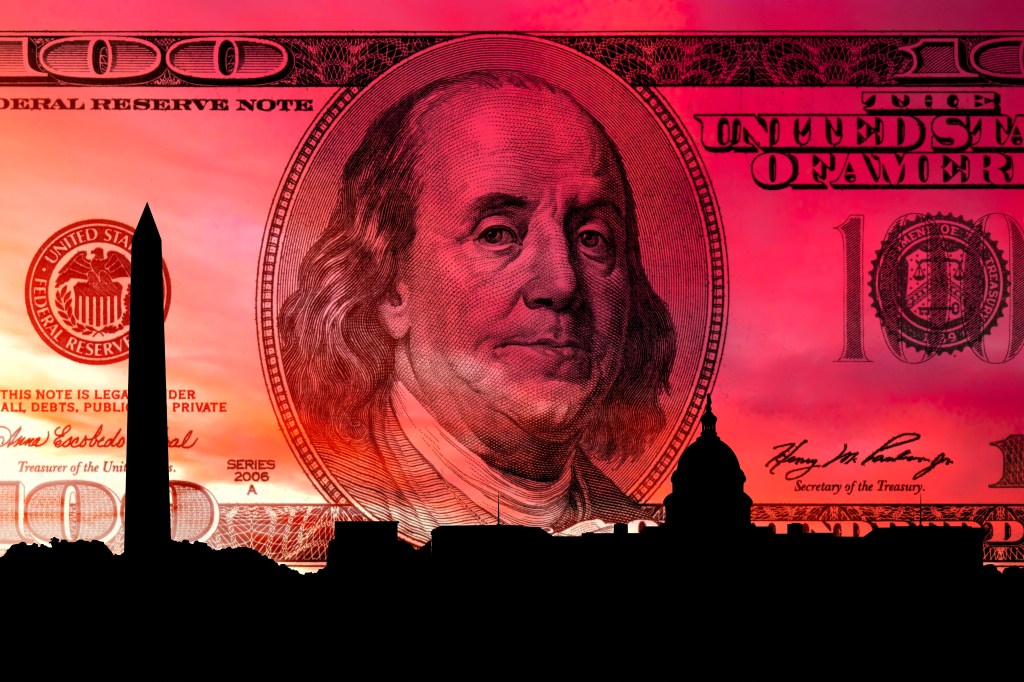There’s a story about Donald Trump—who knows if it is true?—teetering on the edge of one of his many bankruptcies and using the occasion as a teaching moment for Ivanka on the streets of New York: “See that bum over there?” he supposedly said, pointing out a vagrant sleeping on the street. “He is worth $1 billion more than me.” In Trump’s own telling, his unpaid debts added up to a sum of not $1 billion but billions.
New York City knows Donald Trump: a deadbeat, a frequent filer in bankruptcy court, a gonif who often couldn’t pay his bills and often refused to pay them even when he could. He calls himself “the king of debt” and wrote (“wrote”) this about his unpaid debts: “I figured it was the banks’ problem, not mine. What the hell did I care? I actually told one bank, ‘I told you you shouldn’t have loaned me that money.’”
Memo to the bond market: “I told you you shouldn’t have loaned me that money.”
Of course, the word needed in that sentence isn’t me—it is us.
You see that bum over there? He’s worth $37,000,000,000,000.00 more than we are.
Make that $37 trillion and counting.
That’s not precisely right, of course. Depending on how you look at it, the real number is either a little better or a lot worse. The U.S. government does have about $37 trillion in debt, but it also has assets that offset some of that debt. The main asset it has isn’t land or buildings or anything like that—it is, like it or not, its ability to lay taxes on the world’s largest national economy. That’s the good news, such as it is. The bad news is that that $37 trillion isn’t the only liability the government has. The government has made promises regarding Social Security, Medicare, and other entitlements, but it does not have funds ready to make good on these and other promises. Add in the “unfunded liabilities,” as these promises are known, and you end up with a shortfall of something more like (depending on the projections you use) $150 trillion to $175 trillion. You can probably assume that other unfunded liabilities at the state level (including more than $1 trillion in unfunded pension liabilities) will end up on the federal balance sheet via bailouts of one kind or another. So, we probably are talking about five or six times U.S. GDP—at least—promised to bondholders, retirees, and others with a claim on future federal income.
For reference: If we define “money” broadly to include cash, money-market funds, bank accounts, and certificates of deposit, that $150 trillion is a good deal more than all the money in the world.
In reality, it is unlikely that the U.S. government is going to make good on those obligations. As I have been writing for a while now, the real fiscal reform conversation isn’t about how we’re going to go about making good on all those obligations but how we’re going to go about not making good on them. The question for Congress, in the end, is: Which howling mob do you want to face?
So why isn’t the bond market in freefall?
Contra our friends at the Committee for a Responsible Federal Budget (who do generally good work) the chart below does not show bond yields “under stress.” It shows bond yields (a way of expressing how much it costs the federal government to borrow money) going from yield of about 4.2 percent to about 4.5 percent, with ups and downs along the way.

That puts the recent U.S. cost of government borrowing somewhere between that of the United Kingdom and Australia—a lot higher than in Japan or Germany (or France, Italy, Canada …) but not off in Chilean or Brazilian territory—and not at crisis level. What that probably means is that bond investors believe that when the music stops, they aren’t the ones who are going to be left standing there looking stupid without a nice comfy chair. Given a choice between hosing Social Security beneficiaries and hosing bond investors, Washington is going to hose grandma and grandpa, because grandma and grandpa can be made to pay their taxes at gunpoint but nobody can force bond investors to keep lending Uncle Sugar all that money. So while (as of this writing) we have seen a smidgen of hesitation in the bond market, it hasn’t exactly gone mad with fear. Investors still seem happy to go on lending to Washington at a modest premium.
But, for comparison, think on this: If the U.S. government could borrow as cheaply as the sober and buttoned-down Swiss government, then last year’s $1.1 trillion in debt service would have been more like $88 billion. Which is to say, debt payments would be taking a HUD-size bite out of the budget rather than a Pentagon-sized bite. That would be a pretty big improvement, no? I don’t have much interest in radically jacking up military spending, but with a more prudent federal fiscal situation we could have nearly twice the military funding we have today for the same level of overall spending—or, if you are more of a Bernie Sanders type, we could pay everybody’s college tuition and still have half the savings left over to use for debt reduction or something else.
Or we could, you know, just get our act together here in the real world with an eye on lowering our long-term borrowing costs and un-shtupping our finances.
I use the Swiss example because Switzerland’s government spending in recent decades has been pretty close to that of the United States: around 32 to 35 percent of GDP, with the United States trending blindly and idiotically upward of late. But it isn’t the total spending level that really sets the United States apart—we still spend less as a share of GDP than some perfectly normal and well-governed countries, such as Australia and Canada. The difference is that when the Swiss government spends 31.6 percent of GDP, Swiss taxes are 32.2 percent of GDP; when the United States spends 37.5 percent of GDP, taxes are 29.9 percent of GDP. Spending levels in the two countries are similar, but the Swiss run a small surplus and the United States runs a deficit of 7.6 percent of GDP, which is, as the economists say, a big goddamned number and utterly foolish outside of some national emergency. In 1946, when we were cleaning up after World War II, the deficit was 7 percent, a little less than it is today; by 1947, we had a small surplus.
We could spend less. Singapore is a perfectly nice little country where the government spends only about 14 percent of GDP. Taiwan spends only 17.6 percent of GDP. Hong Kong, South Korea, and Ireland all have smaller government-spending footprints compared to the United States.
Or we could tax more. And that doesn’t mean we become a socialist hellhole. That means our tax footprint looks more like that of Australia, New Zealand, Japan, Israel, or the Netherlands, all of which have higher taxes than the United States. Sweden, Denmark, and Norway all have substantially higher taxes—and all currently are outperforming the United States in economic growth.
We could follow the Singapore model by spending less, or we could follow a more Danish model by taxing more—as a purely fiscal matter, there is a case to be made for each.
But what do we do instead? Here’s Donald Trump, the biggest deadbeat in American history, with that feculent band of sycophants known as the Republican Party trailing behind him in the form of a human centipede, ready to make things worse.
A charitable estimate is that the Trump-backed dog’s breakfast of a tax-and-spending bill just passed by the House will add about $3 trillion to the national debt over the coming decade. But the program almost certainly would be worse than that, because all of the fun stuff (the tax cuts and spending) happens now while the hard stuff (partially offsetting cuts) happens at some point in the future. Good luck getting that toddler to eat his broccoli after we’ve fed him a gallon of rocky road and hooked him up to an intravenous Kool-Aid drip.
We’ve been down this happy valley of fiscal imbecility before—the last time Republicans passed a Trump-backed tax-and-spending bill, in fact. Republicans gamed the Congressional Budget Office deficit-scoring procedure by pretending that the 2017 tax cuts were going to expire, with tax levels reverting to their pre-cut level in late 2025; the bill just passed by the House would make them permanent. Republicans were never serious about the expiration date, of course—that was purely a way of avoiding having to tell the truth about the fiscal effects of Republican policy.
As the Committee for a Responsible Federal Budget runs the numbers, the Republican bill would make the total 2027 deficit 34 percent larger than it would be if Republicans simply did nothing. The so-called primary deficit, meaning the deficit excluding interest payments, would just about double, rising 92 percent.
These people like to call themselves “patriots” and pose as hard-headed realists. What they are doing is wrecking the national finances because they don’t have the guts—or the patriotism—to do the hard things. House Republicans are terrified of MAGA primary challengers and the prospect that they might have to (angels and ministers of grace, defend us!) work a little bit to hold on to their seats or even to (O tempora! O mores!) lose their little pissant political positions in the course of serving the real long-term interests of the ignorant and ungrateful people they supposedly serve, who almost always can be counted on to punish anybody in Washington who is trying to do the right thing. The gutlessness on display is truly epic.
Trump, of course, will either be in the ground by the time the fiscal matter hits the fan or else will just pout and insist that it’s all the Deep State trying to ruin his big, beautiful legacy.
In the short term, you can get a lot of juice out of rage and stupidity. In the long term, math always wins.
Words About Words
A Salon headline reads: “On ‘Andor,’ good is a four-letter word.” I have not seen Andor, but I am sure that the headline writer is correct, because good is always a four-letter word.
It is a word with four letters: g-o-o-d, that’s how you spell it.
Some advice I used to give my writing students: Read your stuff out loud and think about the literal meaning of what the sentences actually say—not what you meant to say, and never mind that “style” that you imagine yourself to possess. What do the words say?
I know that my friend Jonah Goldberg has an interest in the Sapir-Whorf hypothesis, an idea from linguistics, no longer given much credit, that our ability to think about the world and conceptualize it is constrained by the features of the language we speak. There is a little something to Whorfianism, inasmuch as we do tend to find it difficult to think about, or in some cases even to notice, things that we do not have words for. For example: In some languages, there is a word for the special duty a wife owes to her in-laws, and no word—or parallel concept—for the duty a husband owes to his in-laws. Now, it is not the case that these languages have that concept because they have the word—the case is the opposite. But even if someone felt that there were such an obligation, exclusively English-speaking people would find it more difficult to talk about (and, hence, to encourage or enforce or analyze) than people speaking a language with a more accommodating vocabulary. “It was on the tip of everyone’s tongue,” the narrator says in Fight Club. ”[We] just gave it a name.” Giving it a name can make a big difference: socialism, feminism, conservatism, etc., were collections of disparate and vague tendencies until someone gave them a name, which, in turn, gave them a program.
But—and here’s maybe the last little remnant of Whorfianism—we have a tendency to let figures of speech run away with us. Some literary-minded psychiatrist (Paul Näcke, a 19th century German proto-feminist, antisemite, and author of The Castration of Certain Classes of Degenerates as an Effective Means of Social Protection) takes an allusion to Greek mythology and puts –ism at the end of it (or, in this case, the German –ismus) and we end up thinking of “narcissism” as though it were something like influenza or smallpox, an identifiable condition rather than a description of a sort of person, as though one could be afflicted with narcissism the way one is afflicted with cancer or a broken leg. (My crankiest midcentury right-wing conviction is that psychotherapy is bunk derived from fashionable pseudoscience. I’m with Morrie Ryskind on that one: “I don’t want to overdramatize, but it was a tense moment: a dozen psychoanalysts, fangs and rattles poised, against one man armed only with a clear conscience and maybe ten martinis.”) Examples abound: trickle-down economics, cultural Marxism, war on drugs (or poverty or illiteracy or modern architecture or whatever), Stockholm syndrome, etc. Call your multifaceted policy program a “war on” this or that and, sometimes, people will start acting like they’re at war, which is how you get SWAT teams in Lubbock, Texas, skulking around in woodland camouflage in a place where you rarely find two trees of any size less than 500 feet apart.
Four-letter word, as a description of profanity, has been in use since at least the late 19th century. An 1886 dispatch from what was then called Bombay (before we all decided to bend to the Marathi chauvinists) says of a certain man: “He was a heathen! And he is dead! You can tell in a four-letter word right where he is putting in his time.” The writer didn’t mean “Ohio,” as bad as that would be, but people did not write “Hell,” or even “hell,” back then. (I myself prefer the capitalized-H version, Hell being, after all, a proper noun.) For a long time, the four-letter words referred to as “four-letter words” were the ones you might commonly see in print today—the other ones, the ones you will not see in these pages, were not only unprintable but un-allude-to-able. As librarian Ken Liss writes:
For many years, hell and damn were the words most commonly referred to in print as four-letter words (with or without the words themselves being printed). Words we associate with the term today do not seem to have been referred to even obliquely in the press. (They were, of course, around long before 1886; just not in the press.)
…
As late as 1921, Charles G. Dawes, a future vice president of the United States and Nobel Peace Prize winner, caused quite a stir using hell and damn at a Congressional hearing. His words were widely reported in the press, but were expurgated in the official transcripts of those hearings published by the Government Printing Office.
Four-letter word is, like adult video or sleeping together, a particular kind of euphemism, one that relies on taking some irrelevant or secondary characteristic of the phenomenon under discussion and treating that as the defining trait. It does not matter how many letters a profanity has in it or that certain kinds of content are restricted to those 18 and older, and the fact that Stan’s wife also may snooze next to his best friend is not what bothers him about the relationship.
Another euphemism for profanity, one that has almost died out, is “Anglo-Saxon expression,” often an “earthy Anglo-Saxon expression.” That Anglo-Saxon English is thought to be closer to the earth and the people than is its fancier Norman cousin is attested to in the pages of Ivanhoe in a conversation about stampeding pigs:
“Gurth, I advise thee to call off Fangs, and leave the herd to their destiny, which, whether they meet with bands of travelling soldiers, or of outlaws, or of wandering pilgrims, can be little else than to be converted into Normans before morning, to thy no small ease and comfort.”
“The swine turned Normans to my comfort!” quoth Gurth; “expound that to me, Wamba, for my brain is too dull, and my mind too vexed, to read riddles.”
“Why, how call you those grunting brutes running about on their four legs?” demanded Wamba.
“Swine, fool, swine,” said the herd, “every fool knows that.”
“And swine is good Saxon,” said the Jester; “but how call you the sow when she is flayed, and drawn, and quartered, and hung up by the heels, like a traitor?”
“Pork,” answered the swine-herd.
“I am very glad every fool knows that too,” said Wamba, “and pork, I think, is good Norman-French; and so when the brute lives, and is in the charge of a Saxon slave, she goes by her Saxon name; but becomes a Norman, and is called pork, when she is carried to the Castle-hall to feast among the nobles; what dost thou think of this, friend Gurth, ha?”
“It is but too true doctrine, friend Wamba, however it got into thy fool’s pate.”
“Nay, I can tell you more,” said Wamba, in the same tone; “there is old Alderman Ox continues to hold his Saxon epithet, while he is under the charge of serfs and bondsmen such as thou, but becomes Beef, a fiery French gallant, when he arrives before the worshipful jaws that are destined to consume him. Mynheer Calf, too, becomes Monsieur de Veau in the like manner; he is Saxon when he requires tendance, and takes a Norman name when he becomes matter of enjoyment.”
“By St. Dunstan,” answered Gurth, “thou speakest but sad truths; little is left to us but the air we breathe, and that appears to have been reserved with much hesitation, solely for the purpose of enabling us to endure the tasks they lay upon our shoulders. The finest and the fattest is for their board; the loveliest is for their couch; the best and bravest supply their foreign masters with soldiers, and whiten distant lands with their bones, leaving few here who have either will or the power to protect the unfortunate Saxon. God’s blessing on our master Cedric, he hath done the work of a man in standing in the gap; but Reginald Front-de-Bœuf is coming down to this country in person, and we shall soon see how little Cedric’s trouble will avail him. “
You get a lot of that in English: War is Germanic, diplomacy is Latinate.
Yes, good is a four-letter word.
So is dumb.
&c.
My friend Jay Nordlinger, who was long an adornment of the pages of National Review and who serves as the music critic at The New Criterion, is writing a newsletter on Substack. This falls into the category of self-recommending things. Jay is my favorite writer on classical music; Jay is invaluable on human rights and the victims of authoritarians; Jay is terrific on language; Jay is wise on politics. He also writes beautifully about a lot of things I do not know the first thing about, such as golf. Jay’s writing on music would be impressive on its own, as would Jay on Russia or Jay on politics—the fact that one writer does so much so well is remarkable. Do yourself a favor and subscribe. Onward and Upward!
Elsewhere
You can buy my most recent book, Big White Ghetto, here.
You can buy my other books here.
You can check out “How the World Works,” a series of interviews on work I’m doing for the Competitive Enterprise Institute, where I am a writer in residence, here.










Please note that we at The Dispatch hold ourselves, our work, and our commenters to a higher standard than other places on the internet. We welcome comments that foster genuine debate or discussion—including comments critical of us or our work—but responses that include ad hominem attacks on fellow Dispatch members or are intended to stoke fear and anger may be moderated.
With your membership, you only have the ability to comment on The Morning Dispatch articles. Consider upgrading to join the conversation everywhere.